The leaders of the BRICS nations addressed the 15th Summit on the second day of the event. What’s the essence of the leaders’ message?
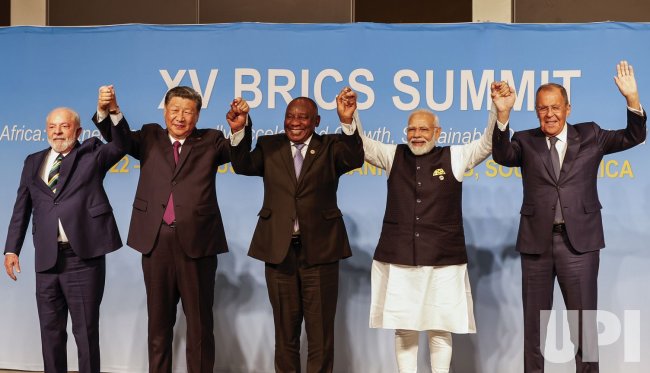
The historic BRICS 2023 Summit has been taking place since August 22 in Johannesburg, South Africa, being seen as the largest-ever BRICS gathering in terms of foreign participants.
As the second day of the event wraps up, Sputnik has summarized the main topics and pressing issues raised by the group leaders on Wednesday.
Cyril Ramaphosa: BRICS Increasing Use of Local Currencies
South African President Cyril Ramaphosa expressed concerns about the increasing weaponization of the global financial system and payment mechanisms for geopolitical purposes.
“We are concerned that global financial and payment systems are increasingly being used as instruments of geopolitical contestation. Global economic recovery relies on predictable global payment systems and the smooth operation of banking, supply chains, trade, tourism, as well as financial flows,” Ramaphosa said.
The South African president noted that BRICS leaders will continue to consider “practical measures” to facilitate trade and investment flows through “the increased use of the local currencies.”
Ramaphosa also singled out the climate change problem, stressing that the transition to clean energy must be fair and “it must be able to take into account the different circumstances that prevail in all countries.”
 Outer Space – Sputnik International, 1920, 23.08.2023
Outer Space – Sputnik International, 1920, 23.08.2023
Indian PM, S. Africa President Hail BRICS Expansion and Space Projects, Slam Dollar Hegemony
The South African leader’s remarks reflected the woes of the continent suffering from energy poverty and negative climate impact of high-polluting wealthy countries.
The Global South continues to reap the whirlwind of environmental disasters despite accounting for just a fraction of greenhouse emissions. At last year’s COP27 African leaders argued that they could use their rich gas deposits as a “transition fuel” and called upon industrialized states to fund the creation of gas and electricity infrastructure on the continent.
However, at the time US President Joe Biden’s climate czar John Kerry said that the West opposes investments in long-term gas projects in Africa since they contradict the net-zero targets.
“In line with this objective, BRICS nations need to advance the interests of the Global South and call for industrialized countries to honor their commitments to support climate actions by developing economic progress. The commitments of support that have been made – that have not yet been lived up to – need to be followed through,” stated Ramaphosa.
He further lamented swirling conflicts across the world, which must be resolved through diplomacy, dialogue, negotiation and adherence to the principles of the United Nations, according to the South African president.
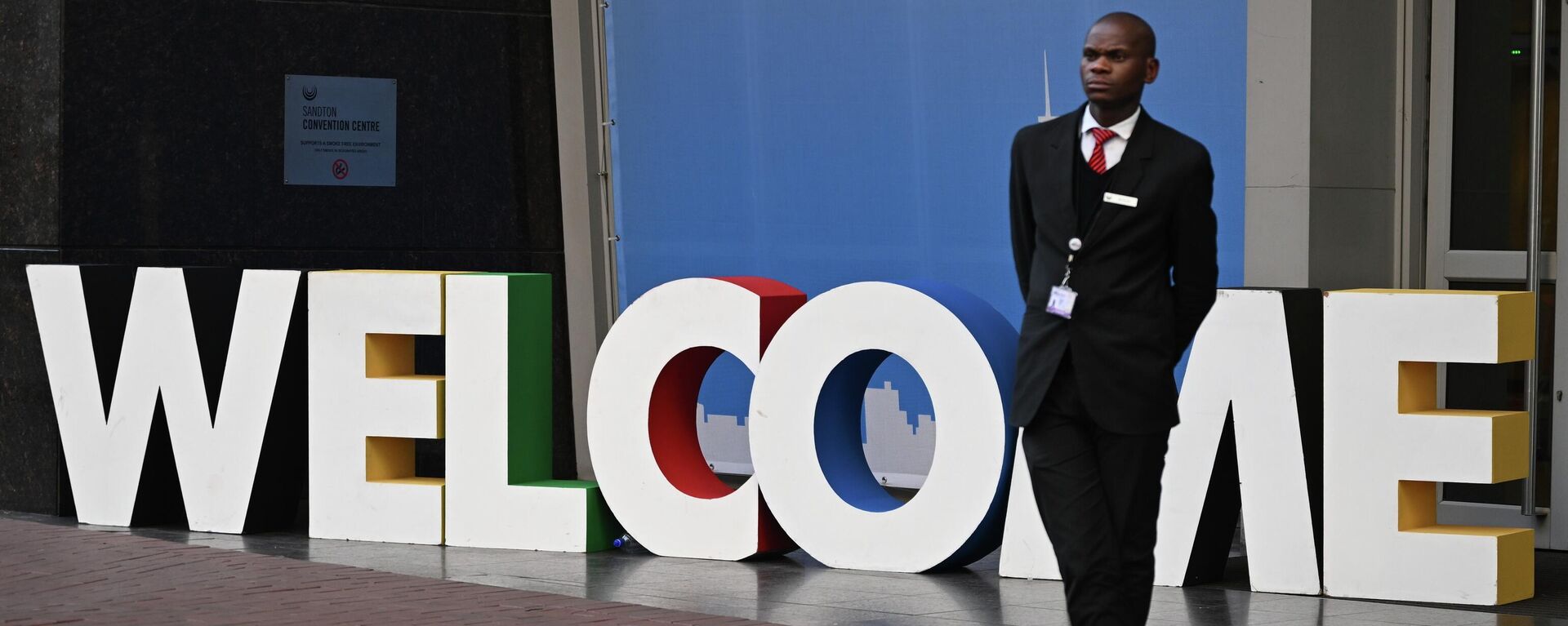 BRICS Summit 2023 – Sputnik International, 1920, 23.08.2023
BRICS Summit 2023 – Sputnik International, 1920, 23.08.2023
Nations Seeking BRICS Membership Want to Avoid Dependence on Superpowers – S. African Minister
Lula da Silva: $2 Trillion Spent on Weapons While 735 Million People Starve
Brazilian President Lula da Silva raised the red flag about the UN Security Council’s impotence to solve security crises, stressing that while the international body has concentrated on the Ukraine conflict many other pressing issues do not receive due attention.
“Many other conflicts and crises do not receive due attention, even though they cause vast suffering for their populations. Haitians, Yemenis, Syrians, Libyans, Sudanese, and Palestinians all deserve to live in peace,” Lula said.
He also lambasted the increase in global military spending at the time of the world’s socio-economic problems, arguing it was “unacceptable that global military spending in a single year exceeds two trillion dollars’, while “735 million people go hungry.”
“The search for peace is a collective duty and an imperative for fair and sustainable development,” Lula stressed.
“Today, we represent 41 percent of the population and are responsible for 31 percent of global GDP in purchasing power parity. But we face a more complex scenario than when we first met. In just a few years, we have regressed from a situation of benign multipolarity to one that returns to the obsolete mentality of the Cold War and geopolitical competition. This is folly,” the Brazilian president said.
 Russian president addresses a message to the participants of 15th BRICS summit – Sputnik International, 1920, 23.08.2023
Russian president addresses a message to the participants of 15th BRICS summit – Sputnik International, 1920, 23.08.2023
Putin Praises Five BRICS Nations for Firm Stance on Global Arena, Defending World Majority
Vladimir Putin: BRICS is Strengthening International Standing
Russian President Vladimir Putin highlighted that the association of five nations “has established itself on the international stage as a respected entity and has been consistently strengthening its standing in international affairs.”
“BRICS has been following a forward-looking strategic course which meets the aspirations of a significant portion of the international community, the so-called global majority. By acting in a coordinated manner and based on the principles of equality, supporting each other as partners and taking each other’s interests into account, we tackle the most urgent issues on the global and regional agendas,” said the Russian president.
Putin noted that the group is successfully implementing its Strategy for BRICS Economic Partnership 2025. In particular, BRICS member states are “strengthening five-sided co-operation in such areas as diversification of supply chains, de-dollarization and the transition to national currencies in mutual transactions, digital economy, support for small and medium-sized businesses, and fair technology transfer,” according to the Russian president.
He underscored that BRICS consistently opposes “hegemonies of any kind” as well as “the exceptional status that some countries aspire to,” defining it as a “policy of continued neo-colonialism.”
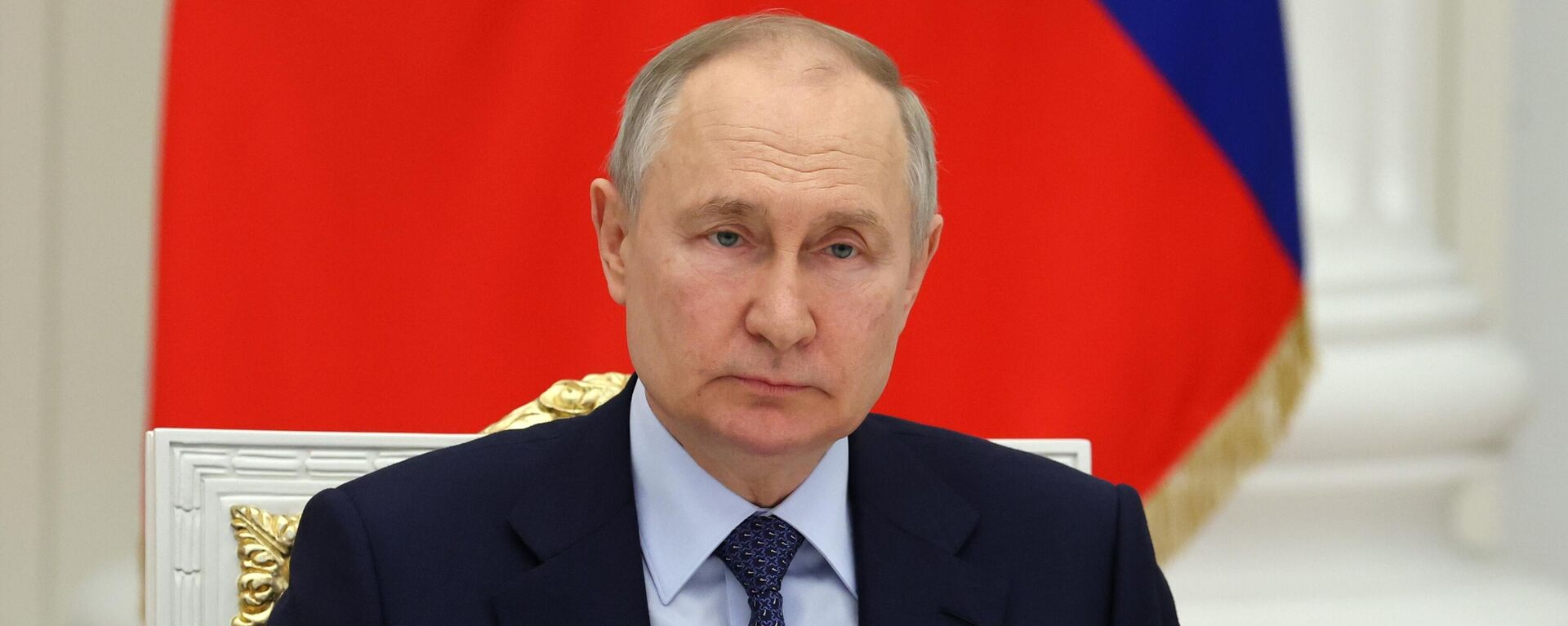 Russian President Vladimir Putin – Sputnik International, 1920, 17.06.2023
Russian President Vladimir Putin – Sputnik International, 1920, 17.06.2023
Putin: Kiev Threw Possible Russia-Ukraine Settlement Deal ‘Into Dustbin of History’ 17 June, 17:47 GMT
Putin pointed out that the attempts by some countries to preserve global hegemony paved the way to a deep crisis in Ukraine, in a clear reference to a proxy war against Russia waged by the US and its NATO allies in Eastern Europe.
“Stopping the war unleashed by the West and its satellites in Ukraine against the people of Donbass is the only thing that defines our actions in Ukraine,” Putin said. “We are grateful to our BRICS colleagues who are active in trying to end this situation and achieve a just settlement by peaceful means.”
In June, the Russian president presented the African delegation with the draft of the Istanbul agreement on the Ukraine settlement, signed by the Ukrainian representatives, which stipulated permanent neutrality and security guarantees for the East European country. “After we withdrew the troops from Kiev, as we promised, the Kiev authorities, as their masters usually do, threw it all into the dustbin of history.“
Commenting on the preliminary peace agreement, US presidential candidate Robert F. Kennedy, – a nephew of US President John Kennedy – bemoaned the fact that Washington and its allies derailed the deal that could have stopped the conflict at early stages: “Tell me, President Biden, how is it worth all this to fight a war that could have ended a month after it began?” Kennedy wrote on X (formerly Twitter) on August 7.
Narendra Modi: India Supports BRICS Expansion
Indian Prime Minister Narendra Modi voiced his support for BRICS expansion during his speech on the second day of the historic summit.
“India supports the expansion of BRICS membership and welcomes the consensus in the initiative. In 2016, during India’s chairmanship of BRICS, we defined (BRICS) as building, responsive, inclusive and collective solutions. Seven years later we can say that BRICS will be breaking barriers, revitalising economies, inspiring innovations, creating opportunities and shaping the future. Together with all BRICS partners we will give active support to make this definition meaningful,” Modi said.
Twenty-three countries have formally applied for membership. Earlier, over 40 countries, including Bolivia, Cuba, the Democratic Republic of Congo, Comoros, Gabon, and Kazakhstan, all expressed their desire to join the club.
Modi also emphasized the need to make the G20 more inclusive by joining countries of the African continent which have long been under-represented in the international body.
“We (India) proposed G-20 membership for African Union countries. I am confident that all the BRICS partners are with the G-20 and everyone will support our proposal. All these efforts, by giving them a special place in BRICS, will give self-confidence to countries of the Global South,” the Indian prime minister stressed.
 At the invitation of U.S. President Joe Biden, Chinese President Xi Jinping attends the Leaders Summit on Climate via video link and delivers an important speech titled For Man and Nature: Building a Community of Life Together in Beijing, capital of China, April 22, 2021. – Sputnik International, 1920, 23.08.2023
At the invitation of U.S. President Joe Biden, Chinese President Xi Jinping attends the Leaders Summit on Climate via video link and delivers an important speech titled For Man and Nature: Building a Community of Life Together in Beijing, capital of China, April 22, 2021. – Sputnik International, 1920, 23.08.2023
Xi Says BRICS States Should Step Up as Mediators in Pressing Issues
Xi Jinping: BRICS Needs to Close Ranks as Cold War Mentality Haunts World
Chinese Chairman Xi Jinping called upon BRICS nations to step up coordination as the “Cold War mentality is haunting” the global community.
“The Cold War mentality is haunting and geopolitical situations are severe,” said the Chinese leader. “The BRICS countries must adhere to the general direction of peaceful development and consolidate the strategic partnership.”
Xi noted that currently, the momentum of the global economic recovery is not stable, citing projections that the world economy will grow by less than 3% this year. Under these circumstances, “there is a long way to go to achieve the sustainable development goals,” he warned. Xi stressed that the BRICS countries “should be companions on the road of development and revitalization, and oppose decoupling and broken chains and economic coercion.”
“We should support each other on issues concerning each other’s core interests, and strengthen coordination on major international and regional issues, actively mediate on hot-spot issues, promote political settlement, and cool down hot-spot issues,” the Chinese leader stated.
On the first day of the forum, Xi’s remarks were delivered by Minister of Commerce of the People’s Republic of China Wang Wentao, who outlined the chairman’s vision of a shared future for mankind and global security.
The vision of a community with a shared future for mankind was reflected in Xi’s Global Security Initiative (GSI), advocating a new path to security featuring dialogue over confrontation, partnership over alliance and win-win over zero-sum. The Chinese chairman’s concept envisages respectful attitude to nations’ sovereignty and legitimate security concerns of all countries while opposing interference in others’ internal affairs, hegemonism and power politics. Thus Xi’s security doctrine strives to build a world of lasting peace and common security.
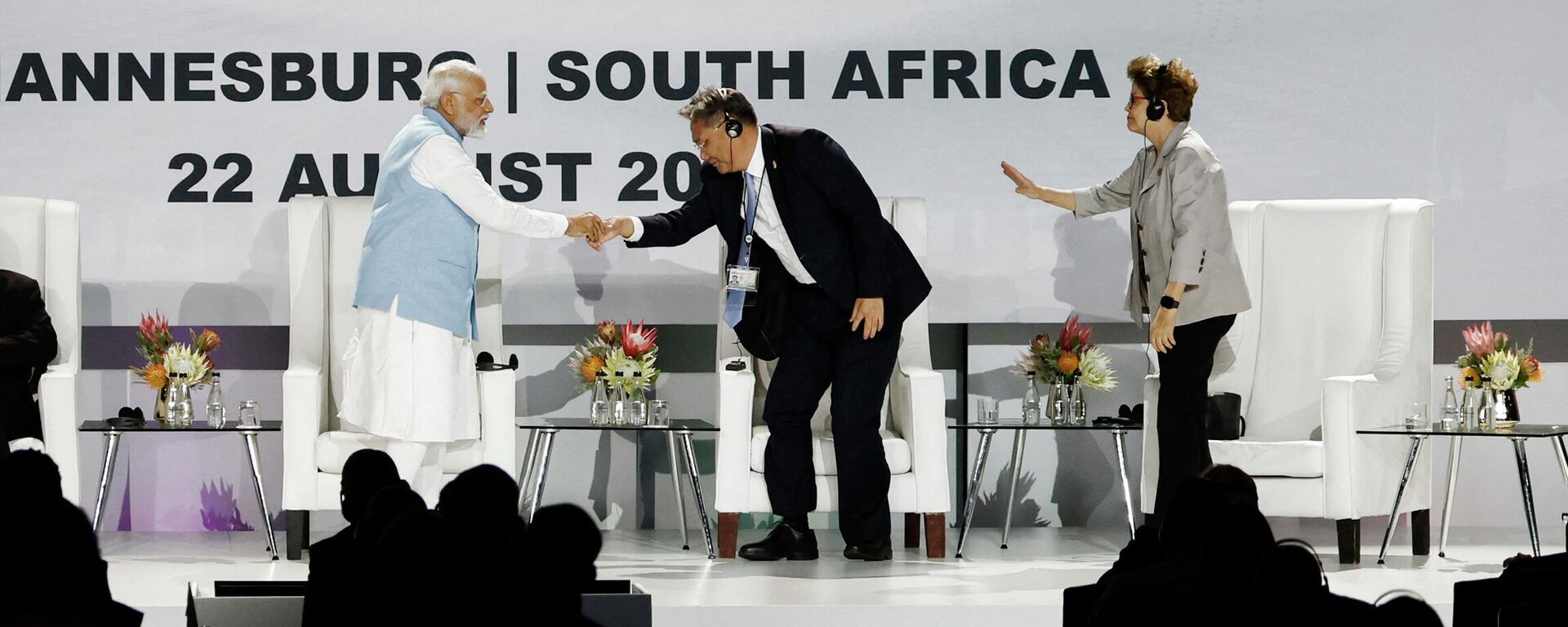 Саммит БРИКС в ЮАР – Sputnik International, 1920, 22.08.2023
Саммит БРИКС в ЮАР – Sputnik International, 1920, 22.08.2023
Leaders’ Speeches Show High Degree of Consolidation and Unanimity Within BRICS
What’s Behind BRICS’ Model Appeal and Why is Hegemonism Doomed?
“The United States is no longer the hegemonic dominant player in the world economy,” Richard D. Wolff, professor of economics emeritus at the University of Massachusetts, told Sputnik.
“That is the most important reality to understand. In the year 2020, that’s three years ago, they were equal. G7 – same portion of world output as the BRICS. But in the last three years, just to show you how it’s changing, the portion of the G7 shrank and the portion of the BRICS grew so that it’s 32% of the world output in the BRICS and 29% of world output in the G7. That’s why the world is changing. That’s why the dollar, which is the United States, cannot play the role that it did. No one should have any illusion this is continuing.”
Per Wolff, de-dollarization is a logical historic process especially when BRICS gained considerable economic size. Now, Brazil, Russia, India, China and South Africa may go with the US dollar or alternative currencies and could offer another way to work out one’s movement of wealth, buying and selling, according to the expert.
“Let me give you one more statistic. The International Monetary Fund keeps producing forecasts, and their latest forecast for how economies are doing covers the rest of 2023 and all of 2024 and what it shows is that the British economy alone among major economies is scheduled to shrink,” Wolff said. “That’s how bad conditions are in Britain over the next 18 months. In the United States, they are expected to grow, maybe 2%, more or less. But the remarkable thing that the IMF forecasts show us is that the two countries that are scheduled to grow the most over the next 18 months among major economies are Russia, but above all, China. Russia, despite the Ukraine war and China growing 2 to 3 times the rate of the United States, which has been the case for the last 25 years, tells you that the direction of change that I’ve been describing is continuing and shows no sign of slowing down.”
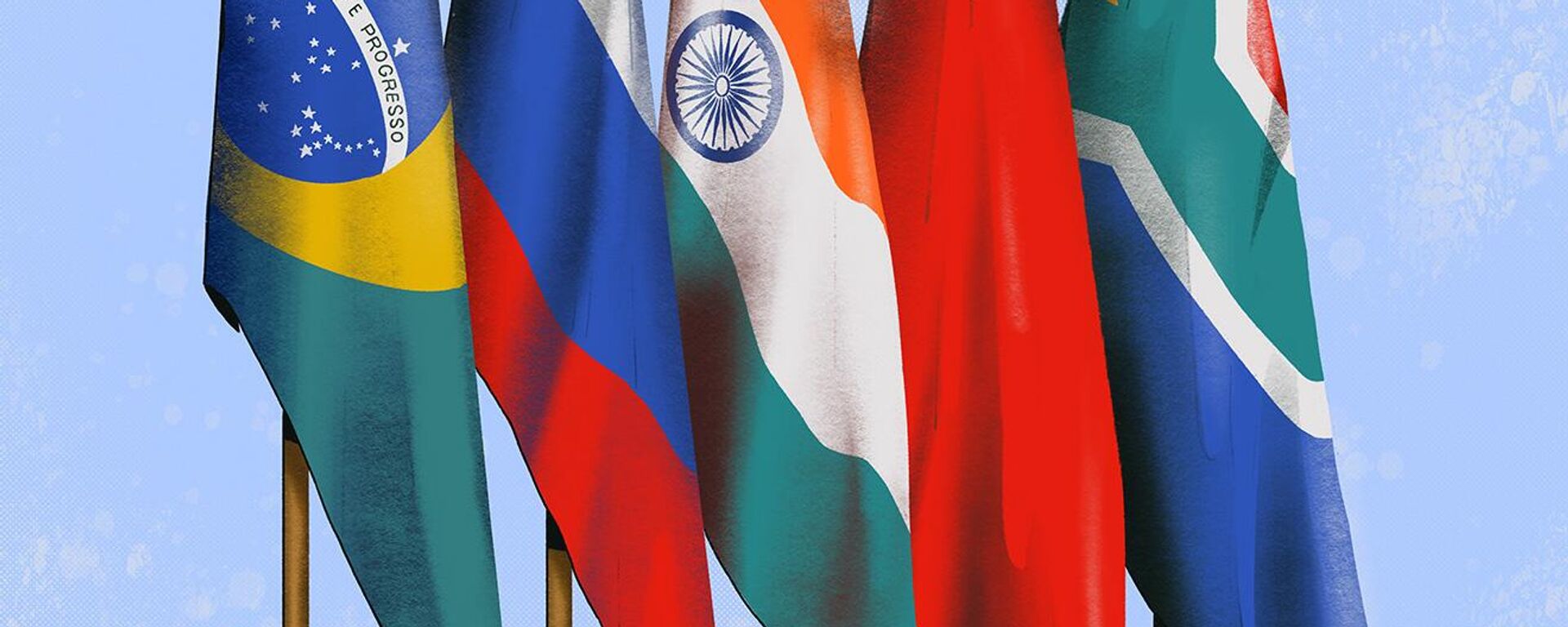 BRICS Summit New Banner – Sputnik International, 1920, 21.08.2023
BRICS Summit New Banner – Sputnik International, 1920, 21.08.2023
Why Does BRICS Appeal to the Global South? 21 August, 17:49 GMT
The world now sees two opposite trends: on the one hand, there’s the decline of the West, led by the US; on the other there is the rise of the developing world, Dr. Radhika Desai told Sputnik’s Critical Hour podcast.
Even though the situation appears to be fluid, poor countries now have an alternative as the world has become much less Western-centric, as per the professor. Meanwhile, BRICS has become an important unifying factor, given its course on further expansion. Desai believes that the 15th summit of the group is nothing short of historic.
The developing world is increasingly seeking to liberate itself from the hegemony of the US and the dollar system diktat, echoed Elijah Magnier, a veteran war correspondent, while speaking on Sputnik’s Fault Lines podcast.
What’s important is that BRICS nations offer a new model, which does not exclude anyone, not seeking to replace the US, but calls upon nations to collaborate and co-exist peacefully, per the correspondent. This message resonates with developing nations of the Global South, while the US proposes more wars, higher military spending and more debt.
“Nobody is stupid except the Americans and the Europeans, because all these other continents are looking at the Americans, at what they are doing. They are looking at (…) the Europeans, how we are destroying our economy, how we are advertising for a massive recession that is coming in this year (…) This is what the Africans are looking at. This is the model that the Africans don’t want anymore,” Magnier said.
And there is another model where BRICS are competing for the development of other states and other continents, instead of engaging in wars and destruction, Magnier concluded.
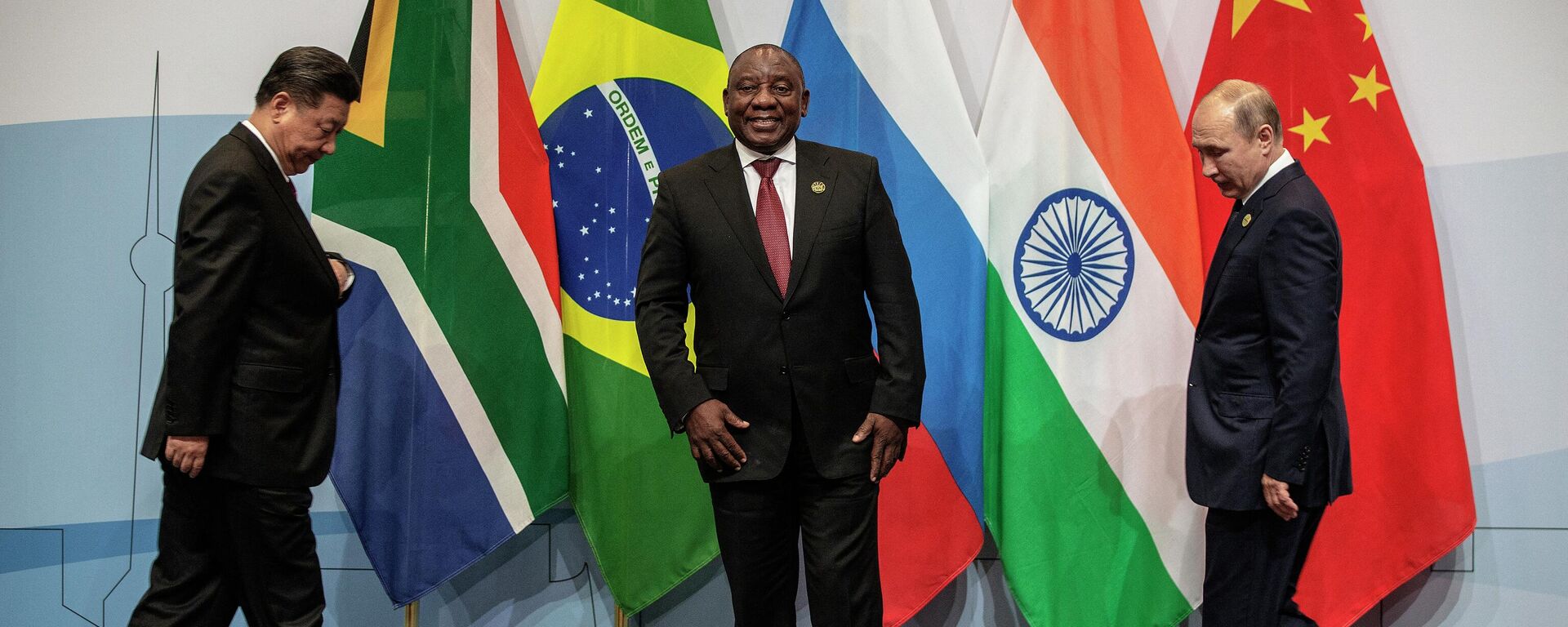
(LtoR) China’s President Xi Jinping, South African President Cyril Ramaphosa and Russian President Vladimir Putin gather to pose for a group picture during the 10th BRICS (acronym for the grouping of the world’s leading emerging economies, namely Brazil, Russia, India, China and South Africa) summit on July 26, 2018, at the Sandton Convention Centre in Johannesburg, South Africa. – Sputnik International, 1920, 22.08.2023
BRICS Leaders Address Most Crucial Global and Regional Problems
By Ekaterina Blinova
Published by Sputnik Globe
Republished by The 21st Century
The views expressed in this article are solely those of the author and do not necessarily reflect the opinions of 21cir.com
